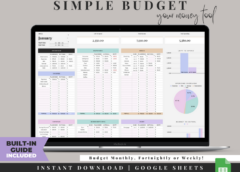
Creating and sticking to a good budget is a must for anyone serious about their financial health. With the right tools and habits, you can reach your financial goals faster. Since everyone has different expenses and sources of income, each budget will be unique. The trick is to find a system that works for you without being too complicated or tedious. Budgeting doesn’t need to be a daunting task. Keep it simple, and you’ll find it manageable and effective.
Setting Financial Goals
No matter your current financial situation, having good financial goals to work towards is essential. Specific goals make it easier to stay motivated and keep moving forward. As you achieve one goal, set another to maintain your momentum. You might think your long-term goals are far off, but you’ll be surprised how much you can accomplish over a few years!
Using the SMART System for Setting Financial Goals
A financial goal is any goal related to saving, making, or investing money, often influenced by your life stage. Major events like marriage or having kids can change your goals significantly. Good financial goals follow the SMART system, which stands for Specific, Measurable, Attainable, Relevant, and Time-Bound. This system helps ensure your goals are realistic and achievable. Avoid setting goals that are impossible to reach, but don’t make them too easy either.
Types of Financial Goals
- Long-Term Financial Goals: These are your main driving force, where you want to end up financially. Examples include being set up for retirement or buying a house. Long-term goals can be several years to decades away. Use the SMART system to set detailed long-term goals that act as a roadmap.
- Medium-Term Financial Goals: Achievable within 1-3 years, these goals include saving for a large purchase, starting an emergency fund, or getting a promotion.
- Short-Term Financial Goals: These are goals you can achieve relatively quickly, within a month to a year. Examples include creating a budget or cutting certain expenses.
Tracking Financial Goals
To keep track of your goals, use a financial goals tracker and worksheet. You can create your own or customize a pre-made sheet. The important thing is to use a system that helps you stay on top of your goals. Tracking your progress keeps you motivated and focused.
Budgeting with Goals in Mind
Good budgeting is crucial for reaching your financial goals. By monitoring your income and expenses, you can save more money and manage your finances better. Here’s how to create a budget that suits your needs:
1. Calculate Your Net Income
Your net income, or take-home pay, is your income after taxes. For those with multiple income sources, calculate a 3-6 month average to account for variability. Use this net income for your budget.
2. Analyze Your Mandatory Expenses
Estimate higher for expenses to be safe. Focus on housing, transportation, and food costs as major categories where you can cut expenses if needed. Factor in irregular expenses like annual fees and maintenance by dividing their yearly cost by 12 and setting aside money monthly.
3. Identify Discretionary Spending
Discretionary spending includes entertainment, dining out, subscriptions, and other non-essential expenses. These are often the easiest to cut when you need to save money.
4. Solidify Your Budget
Ensure your income is greater than your expenses. Prioritize saving and investing goals, then address mandatory expenses. Cut back on major expenses if necessary.
5. Adjust Over Time
Monitor your budget closely for the first few months and adjust as needed. Set aside time each month to review your expenses and budget. This ensures your budget remains effective and you’re not overspending in any category.
Budgeting Tools and Templates
Using budgeting tools can simplify the process. Here are some recommendations:
- Acorns: Ideal for new or low-income investors and savers, Acorns makes it easy to start saving and investing.
- Personal Capital: Provides free financial tools for managing your finances.
- Spreadsheets (Excel): A simple yet effective tool for tracking expenses and budgeting.
Common Budgeting Methods
- 50/30/20 Budgeting: Allocate 50% of your income to needs, 30% to wants, and 20% to savings and investments. It’s a good starting point but may need adjustments based on your needs.
- Zero-Based Budgeting: Ensure every dollar has a purpose, covering mandatory expenses, discretionary spending, savings, investments, and debt repayment.
- The Envelope Method: Allocate cash for different expenses in labeled envelopes to control spending.
- Values-Based Budgeting: Prioritize expenses based on what’s most important to you.
- Paying Yourself First: Focus on saving and investing before addressing other expenses.
Conclusion
Mastering personal finance through effective budgeting and goal setting is achievable. Use the right tools, templates, and methods to create a budget that works for you. Keep it simple, stay disciplined, and regularly review your progress. With these strategies, you’ll be well on your way to financial stability and success.


